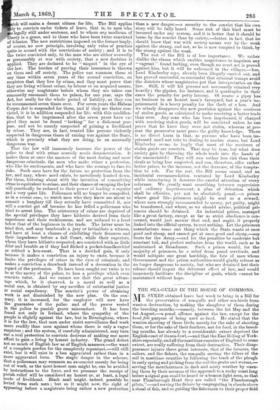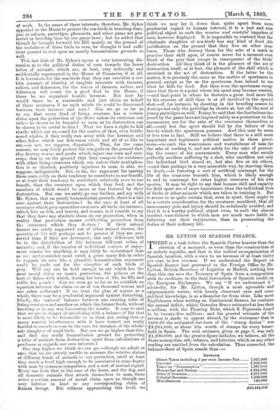THE SEA-GULLS IN THE HOUSE OF COMMONS.
ma SYKES obtained leave last week to bring in a Bill for the preservation of sea-gulls and other sea-birds from wanton destruction, by making the slaughter of them during the breeding months,—namely, between the 1st May and the let August,—a penal offence against the law, except for the bond fine purpose of being used as food. He stated that the wanton shooting of these birds, merely for the sake of shooting them, or for the sake of their feathers, not for food, in the breeding months, has already to a considerable extent deprived the English coast of its sea-fowl,—and that the EastRiding of Yorkshire especially, andall the maritime counties of England to some extent, are really suffering from their destruction. Their disappearance injures three great interests, that of the farmers, the sailors, and the fishers, the sea-gulls serving the tillers of the soil in maritime counties by following the track of the plough in early spring and picking from the soil the grubs and worms,— serving the merchantmen in dark and misty weather by warning them by their screams of the approach to a rocky coast long before a signal gun could be heard or a beacon light seen, so that near Flamborough Head they are called "the Flamborongh pilots,"—and serving the fishers by congregating in clouds above a shoal of fish, and so guiding the fishermen to their proper field
of work. In the name of these interests, therefore, Mr. Sykes appealed to the House to protect the sea-birds in breeding time, just as salmon, partridges, pheasants, and other game are protected in breeding time by our game laws ; but he added that though he brought forward his Bill mainly on the ground of the usefulness of these birds to man, he thought it had sufficient ground to rest upon on merely humanitarian grounds as well.
This last hint of Mr. Sykes's opens a very interesting discussion as to the political duties of men towards the lower tribes of animals, which are, at best, very indirectly and accidentally represented in the House of Commons, if at all. It is fortunate for the sea-birds that they can establish a certain amount. of identity of tangible interests with farmers, sailors, and fishermen, for the voices of farmers, sailors, and fishermen will count for a good deal in the House, if there be no organized hostile interest. But how far would there be a reasonable and just claim on behalf of these creatures, if no such subtle tie could be discovered between their interest and ours ? Can we go so far as to say that every kind of living creature has a certain claim upon the protection of the State unless its existence can either be shown to be harmful to man, or its destruction can be shown to be useful to him ? That we have a right to kill sharks which eat us,—and for the matter of that, even bottlenosed whales, if they really run away with the herrings and other fishes which our fishermen catch and all of us like to est,—is not, we suppose, disputable. That, for the same reasons, we may fairly protect the sea-gulls on the ground that they destroy worms and grubs which injure our corn and rootcrops, that is, on the ground that they compete for existence with other living creatures which are, unless their multiplication is so checked, positively injurious to man, is also, we suppose, indisputable. But, so far, the argument for sparing them rests solely on their tendency to contribute to our benefit, or at least their tendency to contribute relatively more to our benefit, than the creatures upon which they feed, and the numbers of which would be more or less fostered by their destruction. But can we safely go any further, and say with Mr. Sykes, that on purely humanitarian grounds, there is a fair case against their destruction ? In the case at least of all creatures which prey upon other creatures, all birds, for instance, which live on fish, and insects, and worms, is it tenable to say that they have any absolute claim on our protection, when in reality that protection means withholding protection from the creatures which they destroy ? IF their animal tissues are solely supported out of other animal tissues, the quantity of life will perhaps not be greater if they are preserved than if they are destroyed ; the only difference will be in the distribution of life between different tribes of animals ; and, if the number of individual centres of enjoyment counts for anything, it may fairly be maintained that as on3 oyster-catcher must catch a great many fish in order to support its own life, a plausible humanitarian argument could be made out for the slaughter of such birds of prey. Will any one be bold enough to say which has the most moral claim on man's protection, the pelican or the host of fishes with which, during his term of life, he fills and refills his pouch ? Can we even go so far as to establish an equation between the claim on us of ten thousand worms and one robin redbreast? If we trust the plan of nature as a whole, there may be a prudential argument against disturbing, blindly, the natural' balance between one existing tribe of living creatures and another on which the former feeds, without knowing or in any way forecasting the results. It may be said that we are in danger of interfering with a balance of life that is more likely to be favourable to us than not, seeing that so many wanton interferences with it have turned out really hurtful to ourselves,—as in the case, for instance, of the wholesale slaughter of small birds. But can we go higher than this, and find any really humanitarian ground for protecting a tribe of animals from destruction, apart from calculations of prudence as regards our own interests ? One step higher we think we can go,—though we admit at once that we are utterly unable to measure the relative claims of different kinds of animals to our protection. until at least they reach a level high enough to be associated in some degree with man by common sympathies, and a sort of mutual regard. Every one feels that in the case of the home. and the dog, and all domestic animals that attach themselves to man, there arises a certain amount of moral claim upon us, though one very inferior in kind to any corresponding claim of human beings. But without approaching this level, we
think we may lay it down that, quite apart from mere prudential regard to human interests, it is a just and wise political object to curb the wanton and wasteful impulses of men, however displayed. It is impossible to contend that the wholesale slaughter of sea-birds has any kind of bond fide justification on the ground that they live on other creatures. Those who destroy them for the sake of a mark to practise their skill upon, of course never for a moment even think of the prey that escape in consequence of the birds' destruction. All they think of is the pleasure of the act of destruction itself, or at best, the pleasure of the skill which is exercised in the act of destruction. If the latter be the motive, it is precisely the same as the motive of sportsmen in general, except so far as the sportsman does intend to use what he kills for food. But then even the sportsman recognizes that there is a point where his sport may become wanton, —and that point is where he destroys a great deal more life by his exercise of skill than is at all involved in the special shot, —if, for instance, by shooting in the breeding season he destroys not only the partridge he shoots at, but all the nest of young partridges as well. It may be said that the limitations imposed by the game laws are imposed solely as a protection to the amusement, not for the sake of the creatures themselves at all,—only lest the sport should fail by the failure of the breeds which the sportsman pursues. And this may be more or less true in fact. Still we believe that there is a still more important and legitimate political motive in these provisions—to curb the wantonness and wastefulness of man for the sake of curbing it, and not solely for the sake of protecting the source of his amusements. Every man who entails perfectly needless suffering by a shot, who sacrifices not only the individual bird aimed at, but also five or six others, —and that perhaps in a very miserable way, by starving them to death,—is fostering a sort of artificial contempt for the life of the creatures beneath him, which is likely enough to end in contempt for other higher creatures of his own species. It may be right to say that human skill and capacity for field sport are of more importance than the individual lives of birds, or other animals which are taken in training it. But it seems to us quite certain that, even in sport, there ought to be a certain consideration for the creatures sacrificed, that all unnecessary pain and injury should be sedulously avoided, and that it is a worthy political object even, to curb the almost insolent wastefulness to which men are much more liable in following out their enjoyments, than in prosecuting the duties of their ordinary life.



































 Previous page
Previous page